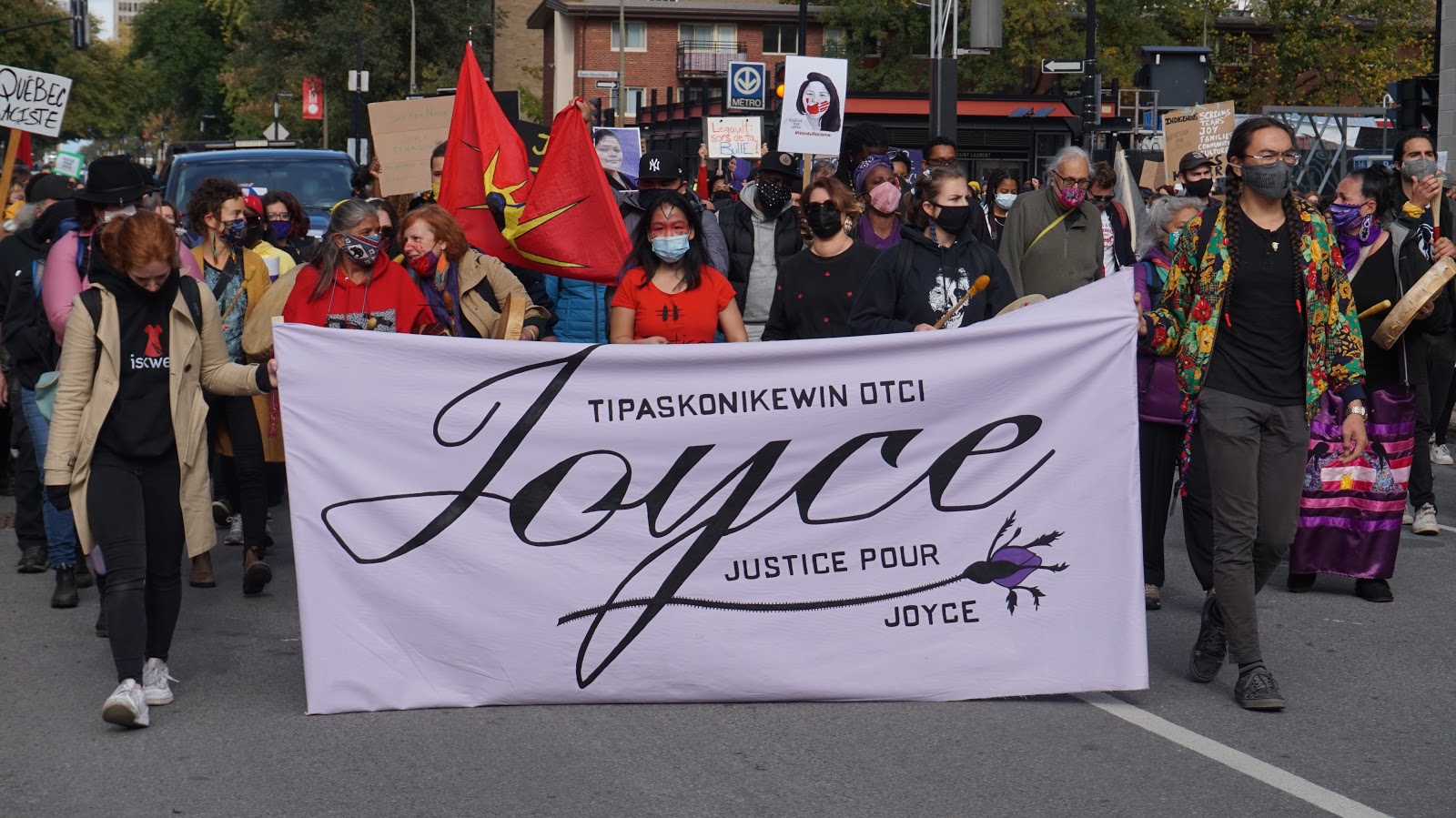Thousands gathered at Place Émilie-Gamelin on Oct. 3 to participate in a peaceful demonstration, organized by the Native Women’s Shelter of Montreal and its Executive Director Nakuset, Iskweu, and Janis Qavavauq-Bibeau, to demand justice for Joyce Echaquan. Joyce was a 37-year-old Atikamekw woman and mother of seven who faced racist verbal abuse from hospital staff while she lay dying in a hospital in Joliette on Sept. 28. The masked and socially-distanced crowd chanted “Justice for Joyce” as they marched down Rue Berri, calling for legal justice for Echaquan and pushing to eradicate institutionalized racism against Indigenous Peoples across the country.
Joyce Echaquan, who went to the Centre Hospitalier De Lanaudière in Joliette, Quebec because of stomach pains, was the victim of taunts and racist insults by the hospital staff. Echaquan live streamed the incident on Facebook as she pleaded for help, just before her death.
Janis Qavavauq-Bibeau was one of the event organizers and is currently the Research Coordinator for the Iskweu Project, an initiative started by the Native Women’s Shelter. The project was started as a direct response to the increasing number of missing and murdered Indigenous women and girls (including trans and two-spirit) in the province and nationwide.
“Tuesday morning, I watched the video with my boss and my colleague Jess,” Qavavauq-Bibeau said. “My boss asked, ‘what do we do?’ I said we are going to march [and] we are going to give a voice to Indigenous people who don’t have one.”
The demonstration attracted people of all ages, including Chloe Rodriguez, U3 Arts, who heard about the event through social media.
“It was an emotional space [and] the atmosphere was heavy, but the urgency and necessity of the moment was definitely present,” Rodriguez said. “The speakers were extremely powerful. I felt humbled and enraged by their words.”
Speakers at the demonstration represented various Indigenous organizations across Montreal, including the Native Women’s Shelter of Montreal, the Native Friendship Center, and Quebec Native Women Inc. Political leaders from both the city and Québec solidaire also took part in the gathering, advocating for political leaders to address systemic racism in Quebec.
Alisha Tukkiapik, an Inuk woman and head of the National Indigenous Commission of Québec solidaire, delivered an impassioned speech to the crowd.
“It hurts so much that Joyce had to record to get this attention, because we’ve been dealing with this for hundreds of years and she’s not the only victim that we’ve had and lost,” Tukkiapik said.
Marie-Ève Bordeleau, a Cree woman and Commissioner of Indigenous Relations for the City of Montreal, called on the Quebec government to act and emphasized the importance of unity in the process of dismantling institutionalized racism.
“Together, we need to accept our differences,” Bordeleau said. “Together, we can change the system and eradicate systemic racism. Together, we will change the system. Indigenous people, non-Indigenous people, governments: It is time. Let’s not find any more excuses for our inactions.”
Joyce Echaquan’s death adds to the disturbingly high number of missing and murdered Indigenous women in Quebec and across Canada. Last year, as part of the National Inquiry into Missing and Murdered Indigenous Women and Girls, a supplementary report gave the province of Quebec 21 recommendations to ensure the safety and well-being of women, girls, and 2SLGBTQIA people in the province
“For those who are in a position in the health care field, in the youth protection field, in the justice field, read the recommendations [and] apply them,” Nakuset said.
On Oct. 3, Quebec Public Security Minister Geneviève Guilbault announced that she will be launching a public inquiry into Echaquan’s death and Centre hospitalier de Lanaudière. This investigation is currently ongoing.








